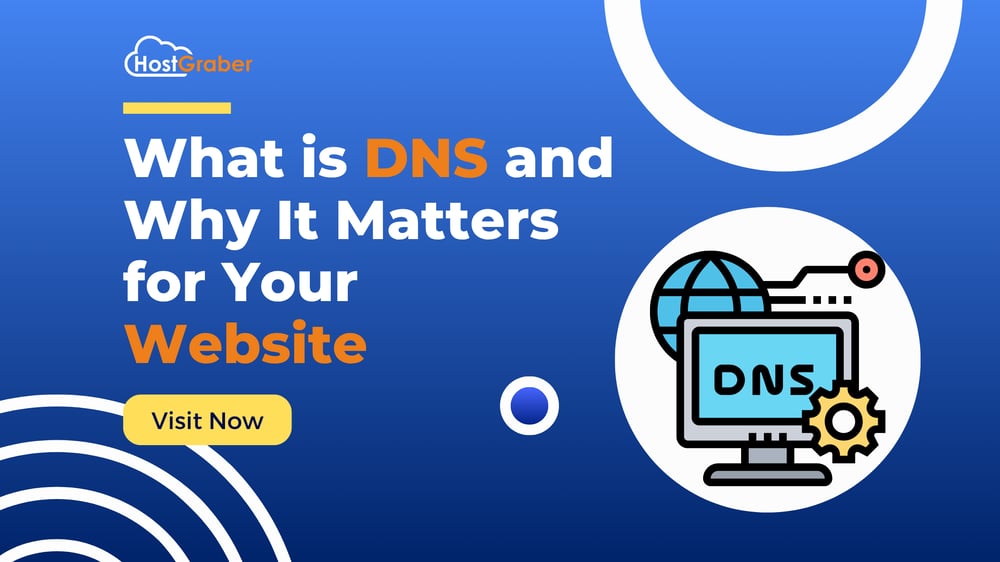What is DNS and Why It Matters for Your Website
Web Hosting Tutorial Domain name system domain name DNS Jun 9, 2025 6:18:09 PM HostGraber 3 min read

When you type a website address like www.example.com into your browser, how does your device know where to go? The answer lies in something called DNS. If you’ve ever asked, “What is DNS?” — you’re not alone. Let’s break it down in a simple, easy-to-understand way.
What is DNS?
DNS stands for Domain Name System. It’s often referred to as the “phonebook of the internet.” Just like you use a phonebook (or contacts list) to match names to phone numbers, DNS matches domain names (like google.com) to IP addresses (like 142.250.182.206).
Computers and servers communicate using IP addresses. But remembering numbers like those is hard for humans. That’s why DNS was created — to make browsing easier by letting us use words instead of numbers.
Why Is DNS Important?
Without DNS, we’d have to remember and type in IP addresses for every website we want to visit. Not only is that inconvenient, but it’s also impossible to manage at scale.
Here’s why DNS is so crucial:
- It allows websites to have user-friendly names.
- It enables automatic updates if a website’s IP changes.
- It reduces the need for centralized directories.
- It speeds up your browsing experience with caching.
In short, the Domain Name System is a vital part of the internet’s infrastructure.
How DNS Works (Step-by-Step)
Understanding how DNS works will help you see why it’s so important. Here’s a simplified version of what happens when you visit a website:
- You type a domain name into your browser (e.g.,
www.hostgraber.com). - Your computer checks the DNS cache to see if it already knows the IP address.
- If not, the query goes to a DNS resolver, often managed by your ISP.
- The resolver asks a root DNS server where to find the
.comdomain. - The root server replies with the IP address of a TLD server (like
.com). - The resolver asks the TLD server for the IP address of
hostgraber.com. - The TLD server points to the authoritative DNS server.
- The authoritative server provides the actual IP address of the website.
- Your browser uses this IP to connect to the site and load the page.
All of this happens in milliseconds.
What Is a DNS Server?
A DNS server is a computer that stores a database of public IP addresses and their associated hostnames. These servers help translate domain names into IP addresses.
There are four main types of DNS servers:
- Recursive Resolver – Handles client requests and queries other servers.
- Root Name Server – First stop for DNS lookups.
- TLD Name Server – Stores information for top-level domains like
.com,.org. - Authoritative Name Server – Holds actual domain records (A, MX, CNAME, etc.).
Each plays a key role in the domain resolution process.
Common DNS Terms You Should Know
- IP Address: A string of numbers that identifies a device or website on the internet.
- DNS Lookup: The process of translating a domain name into an IP address.
- DNS Record: Information stored in DNS, such as A (Address), MX (Mail), or CNAME (Alias) records.
- TTL (Time To Live): Defines how long a DNS record stays cached.
DNS and Website Speed
A fast DNS resolution means your website loads quickly. If your DNS provider is slow, it could delay the initial connection to your site. Using a reliable DNS hosting service or a Content Delivery Network (CDN) can help speed up DNS resolution and improve user experience.
Can DNS Be Hacked?
Yes, DNS can be vulnerable to attacks like:
- DNS Spoofing/Cache Poisoning: Redirects users to malicious websites.
- DDoS Attacks: Overloads DNS servers to disrupt services.
Using DNSSEC (DNS Security Extensions) and secure DNS providers can help prevent such risks.
Final Thoughts
To sum it up, what is DNS? It’s the invisible yet essential system that connects domain names to IP addresses, helping users reach the right websites with ease. Without DNS, navigating the internet would be far more complicated.
Understanding how DNS works and its importance gives you better control over your online presence — especially if you’re managing websites or online services.
